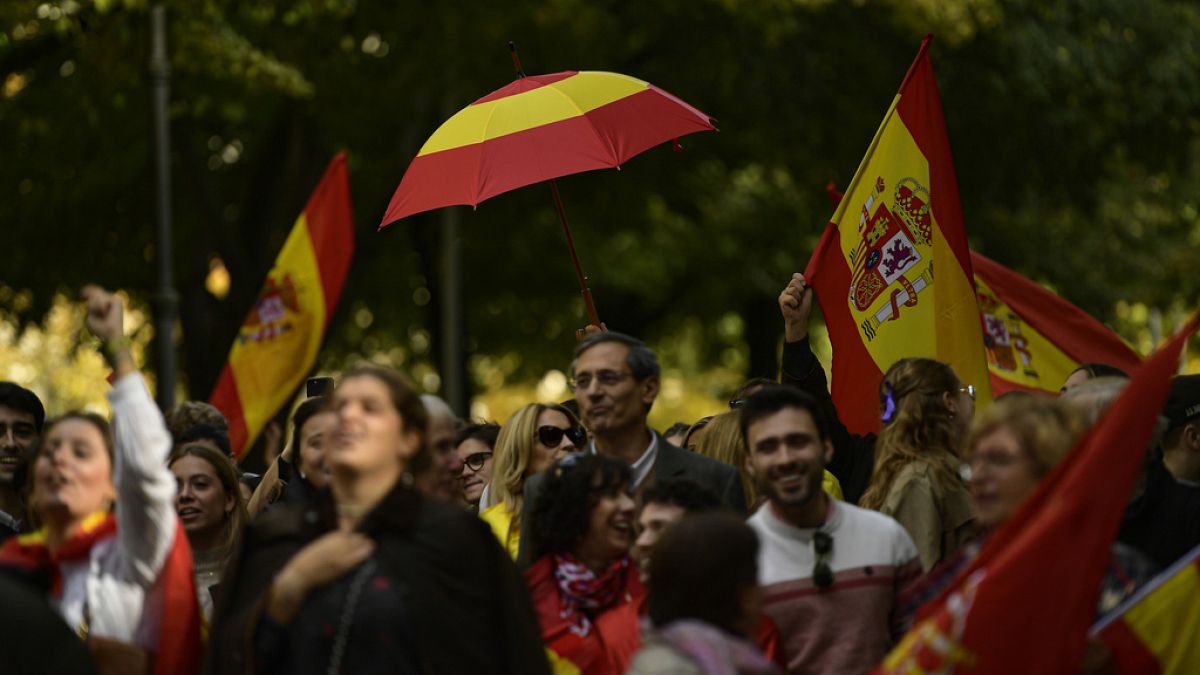The conservative PP and far-right Vox party claim the amnesty measure goes against the principles of equality, territorial unity and the separation of powers.
Thousands of right-wing demonstrators took to the streets of Spain on Sunday to protest against the government's decision to grant amnesty to Catalan separatists.
The deal struck with Together for Catalunya boosts Spain's acting Prime Minister Pedro Sánchez's chances of forming a new minority coalition government following an inconclusive election in July.
Together for Catalunya, also known as Junts, is a group bent on achieving independence for the northeastern region of Catalonia and is headed by Carles Puigdemont, who fled Spain after leading an illegal secession bid in 2017 that brought the country to the brink.
Key to the agreement is a massively controversial pardon that could benefit Puigdemont and thousands of other secessionists. But the proposal, backed by several smaller left-wing parties, has roused the ire of the conservative and far-right opposition parties that represent roughly half the country’s population. Many in the judiciary and police are also opposed.
The rallies on Sunday were organised by the conservative People's Party (PP) and the far-right Vox party and were held in all of Spain's provincial capitals.
"We will win this battle," declared PP leader, Alberto Núñez Fejióo, during the rally in Madrid.
According to government sources, some 80,000 people attended the event in the Spanish capital.
Fejióo reminded participants in his speech that his party received the most votes in July's General Election, although it did not achieve the parliamentary support necessary to govern.
The conservative leader questioned why Sánchez, the leader of the socialist PSOE party, is "afraid of the polls" since "never before in Spain" has a person who lost the elections governed. He has consistently called for a second election.
Fejióo also suggested that if the PP had come to such an agreement, a general strike would have already been called in Spain, something that many of the attendees demanded in chorus while the conservative leader concluded that Sánchez "would have to present his resignation" or "he will leave with dishonour".
Meanwhile, the leader of the far-right Vox party, Santiago Abascal, accused Sánchez of carrying out "a coup d'état" and showed his support for a strike.
Perceived by part of Spanish society as an attack on the rule of law, the controversial amnesty proposal comes six years after the attempted secession of Catalonia which was constituted one of the worst crises politics of contemporary Spain.
But Sánchez, whose government has already granted pardons to several jailed leaders of the Catalan independence movement, says the amnesty will be positive for Spain because it will calm waters inside Catalonia.
An amnesty would allow five Catalan leaders who fled the country, including Puigdemont, to return to Spain and even run for office again someday.
Given that Puigdemont is considered public enemy No. 1 for many Spaniards, and Catalan independence a politically toxic issue, some wonder why Sánchez, who has long opposed any amnesty, is now pushing for it. The answer, critics say, is pure political necessity and the desire to stay in office.
The idea of independence from Spain stretches back decades, if not centuries, for a region that is fiercely proud of its institutions, traditions, and Catalan language, which is spoken along with Spanish.
It gathered momentum during the financial crisis of 2008-2013 and then peaked in 2017 when Puigdemont, as regional president, held an illegal ballot on secession and made an ineffectual declaration of independence that received zero international recognition.
The nearly eight million inhabitants of Catalonia, whose capital is Barcelona, are roughly divided over independence, although the latest opinion polls in the region indicate fewer favour secession.
